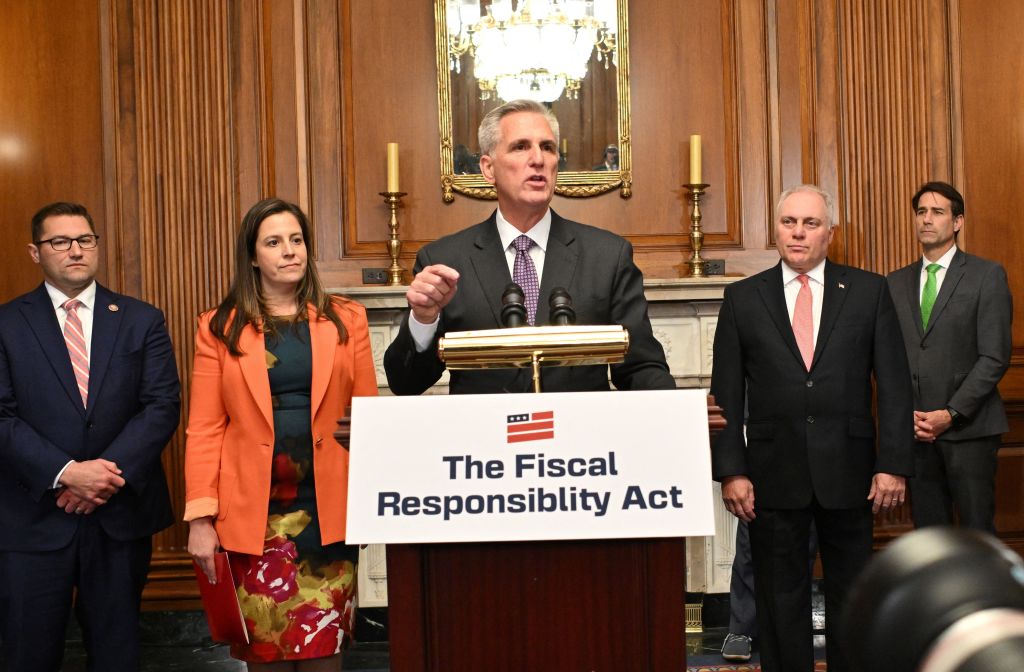PRESENTED BY

THE TOP
Happy Thursday morning and welcome to June.
Late last night, the House cleared the bipartisan debt-limit bill by an overwhelming 314-117 margin.
And today, the Senate today kicks off what could be a brisk, 36-hour sprint or a drawn-out, days-long marathon on that legislation, the Fiscal Responsibility Act.
Leaders in both parties hope it’s the former. Not only to preserve their weekends, but to calm world financial markets ahead of the deadline Monday for a U.S. government default.
Based on our conversations with leadership aides, there’s a reasonable hope that the Senate can pass the debt-limit package by Friday night. And last night’s blowout House vote will lend some momentum to this. Two-thirds of House Republicans were in favor, with an even bigger total among Democrats.
The key here for Senate Majority Leader Chuck Schumer will be clinching a time agreement with senators who are demanding votes on amendments — and then making sure that those amendments don’t pass. We expect all of these amendments to be considered at a 60-vote threshold.
The New York Democrat could file cloture on the motion to proceed to the House-passed bill as soon as today if there’s no agreement.
Schumer emphasized on Wednesday that the U.S government would default on its debt if the House needed to take up an amended bill. So in some ways, the amendment push is an exercise in political theater.
Senate Minority Whip John Thune told us that he’d heard from at least a dozen GOP offices seeking amendment votes, and some Democrats are interested in amendments as well.
Importantly, Schumer has backing from Minority Leader Mitch McConnell and other GOP leaders when it comes to the urgency of passing this bill, which extends the debt limit until Jan. 1, 2025, while also cutting government spending. And senators who are vehemently opposed to the package are signaling they won’t try to drag out debate — as long as they get a vote on their amendment.
Here’s what’s in play on the amendment front. Schumer, McConnell and their whips will be working feverishly to ensure that none of these clear the 60-vote threshold.
Even more spending cuts: Sen. Rand Paul (R-Ky.) wants a vote on his proposal to enact stricter spending cuts over a longer period of time. Paul won’t hold up a time agreement as long as he gets a vote. Paul also acknowledged the reality that his amendment won’t get close to the requisite support.
Boosting defense spending: As we reported in a special edition Wednesday, the defense spending cap was a major point of conversation during the weekly GOP lunch. The legislation honors President Joe Biden’s defense spending request of $886 billion, a number that Republican hawks have panned as woefully insufficient.
There are several GOP senators looking to make their displeasure known. Sen. Dan Sullivan (R-Alaska), who was outspoken during yesterday’s lunch, will have an amendment that repurposes some of the IRS tax enforcement funding and adds it to the Pentagon topline, according to a person familiar with the amendment.
Sen. Lindsey Graham (R-S.C.) is also in the mix here, as is Sen. Tom Cotton (R-Ark.), who we’re told wants to mitigate the ability of Senate leaders to cut defense spending below $886 billion in the event of a sequester.
Sen. Jon Tester (D-Mont.), who chairs the Defense subcommittee on the Senate Appropriations panel, called the Pentagon funding level “concerning.” But Tester acknowledged that “You put on an amendment, it goes back to the House and you default on your debt. There’s not a lot of choice.”
The goal for Schumer and McConnell is to make sure these defense-related amendments don’t get 60 votes. McConnell, it’s worth noting, said the defense topline is “the worst part” of the bill but agreed with Schumer that it shouldn’t be changed at this stage.
The Mike Lee factor: Sen. Mike Lee (R-Utah) has delivered stinging critiques of the Biden-McCarthy compromise bill, calling it “a fake response to burdensome debt” that is “born out of cowardly fear of confrontation and lack of conviction.” Ouch.
Lee has proposed a number of changes to the bill. But the one he’s most interested in is getting rid of a provision giving OMB Director Shalanda Young the power to waive statutory PAYGO requirements barring tax or spending changes that increase the debt.
Pipeline politics: Sen. Tim Kaine (D-Va.) and other Virginia Democrats are frustrated that the agreement included a final approval for the Mountain Valley Pipeline, a priority for the GOP and Sen. Joe Manchin (D-W.Va.).
Kaine took some uncharacteristic swings at the White House over the issue, complaining that the Virginia delegation was never consulted and arguing that the provision bypasses the normal approval process for energy projects. Kaine wants a vote on his amendment to strike the pipeline approval from the bill.
— Andrew Desiderio
Don’t forget: Join us on Thursday, June 15 at 9 a.m. ET as Punchbowl News Managing Editor Heather Caygle sits down with Rep. John Joyce (R-Pa.) to discuss healthcare innovation and the future of cancer research following the Inflation Reduction Act. RSVP now to join us in-person or on the livestream.
THE DEAL
What we’ve learned about McCarthy in the debt-limit fight

Kevin McCarthy came into the speakership 145 days ago as an anomaly, of sorts. He entered the job seen as a weak leader, only having secured the gavel after 15 rounds and scores of concessions to his conservative flank.
McCarthy was criticized as being a policy lightweight who never shepherded a major piece of legislation into law.
But after the last five months, McCarthy has successfully completed one of the thorniest legislative tasks a Republican speaker has to undergo — lifting the debt limit with a Democratic-run Senate and a Democrat in the White House.
The Fiscal Responsibility Act, which passed the House on Wednesday evening with 314 yes votes, is a policy and political success for both McCarthy and President Joe Biden — more so for the speaker.
It gave McCarthy and Capitol Hill Republicans a slew of policy victories. It cuts spending — all with McCarthy’s party controlling just one lever of power. McCarthy entered the negotiations in February with little-to-no leverage and emerged with some wins.
And most importantly, 67% of House Republicans voted for the debt-limit bill on Wednesday — a stunning total that would make previous GOP speakers blush.
Biden was able to protect Democrats’ hard fought wins from the 117th Congress as well. Biden can also tout this as another example of his ability to work with Republicans.
There are a few things we learned about McCarthy, his leadership style and how he notched a victory here.
No. 1: Good fortune and luck. There were three distinct events that allowed McCarthy to get this deal done.
First, McCarthy gambled and was able to push the Limit, Save, Grow Act – the GOP-only debt-limit package – through the House. This wasn’t exactly luck. McCarthy spent a huge amount of political capital to get this done. But doing that helped drag the White House to the negotiating table.
Second, Biden waited to hold talks with Republicans on a debt-limit increase for several months. Most Democrats we spoke to think this was a blunder. Others say Biden had no GOP plan to react to until April. But Biden’s decision not to engage with McCarthy until May helped solidify Republicans behind the speaker and gave him more leeway than usual to pursue a deal.
Third, McCarthy allies feel strongly that getting Senate Majority Leader Chuck Schumer out of the negotiations helped him move talks along with Biden.
One of the big questions in this fight is whether Schumer misjudged McCarthy and his support in the House GOP Conference. Schumer was one of the chief proponents of trying to “break” House Republicans’ resolve and force GOP lawmakers to approve a clean debt limit — something they swore they wouldn’t do. Schumer counters by saying Republicans settled for less than their initial offer.
No. 2: Leading by committee. Something we’ve seen McCarthy do consistently is decentralize power to his allies. Reps. Patrick McHenry (R-N.C.), Garret Graves (R-La.) and French Hill (R-Ark.) led negotiations with the Freedom Caucus to put McCarthy in the speaker’s seat. And McHenry and Graves took the lead with the White House in negotiating this package.
This is smart for McCarthy. He’s a strategist, not a policy expert — the opposite of former Speaker Paul Ryan in some ways. McCarthy allowed McHenry and Graves to play to their strengths. McCarthy sketched out the broad standards that any deal needed to adhere to — spending cuts, work requirements and reclaimed Covid money — and Graves and McHenry went and hashed it out with the White House.
No. 3: McCarthy figured out the press. Since the Trump era, McCarthy has had a bit of a rocky relationship with the Hill press corps. He thought reporters’ questions were hostile and frequently got frustrated with inquiries about former President Donald Trump.
But for the last 100 or so days, McCarthy, McHenry and Graves couldn’t take a step without engaging reporters over the negotiations. The speaker gaggled on live TV, he held lengthy press conferences outside of his office and just about everywhere else. Democrats frequently griped that McCarthy set the narrative for the debt-limit showdown.
No 4: The right is still a problem. To say the right doesn’t like McCarthy would be a misunderstanding of conservatives’ gripes. The right doesn’t like governing in divided government.
When McCarthy said Limit, Save, Grow was a gambit to get him to the negotiating table with Biden, he meant it. Instead, conservatives held the bill against McCarthy and wondered aloud why he couldn’t extract anything more from Biden.
Conservatives’ previous standard was that McCarthy had to get a majority of a majority on a bill. Now that a majority of a majority voted for the Fiscal Responsibility Act, that’s not good enough for McCarthy’s conservative critics. The new standard apparently is that bills can’t pass the House with more Democratic votes than GOP votes — something McCarthy has no way of controlling.
Will the right try to remove McCarthy using the motion to vacate? Maybe. There’s already talk about conservatives seeking to oust McCarthy when they return to Washington next week.
We asked McCarthy about this possibility after Wednesday’s vote. His reaction says something about where the speaker is right now:
“Bring it!”
When asked whether he promised conservatives whether he’d only support bills that had more GOP support than Democratic support, McCarthy countered “I don’t remember that at all.”
No. 5: Some problems in GOP leadership ranks. A trio of chairs voted against the bill. Rep. Mike Bost (R-Ill.), the chair of the House Veterans’ Affairs Committee, and Rep. Mike Guest (R-Miss.), the chair of the Ethics Committee, voted no. As did Rep. Gary Palmer (R-Ala.), the chair of the Republican Policy Committee.
BTW: The drama surrounding the Fiscal Responsibility Act was the swan song for Dan Meyer, McCarthy’s chief of staff. Meyer — who led the McCarthy negotiating team — is leaving Congress after decades of government service.
— Jake Sherman and John Bresnahan
PRESENTED BY APOLLO
As experienced partners to pensions and retirement plans, Apollo and Athene are focused on providing retirement savings products that help people achieve financial security so they can retire better. We’re proud to be a part of a secure future for those that work so hard for our communities. That’s why Apollo and Athene are redefining what retirement can be. Learn more.

Solutions to speedy bank runs ‘not ready for primetime’
If there was one thing that really stressed out lawmakers following the regional banking crisis in March, it was the speed of the bank failures. The phrase “social media-fueled bank run” has gotten a lot of play in the last few months.
But worrying about something and legislating on it are two very different things. This is going to be a tough problem for Congress to solve.
Start with the crisis itself: The speed with which depositors pulled out money at Silicon Valley Bank was historic, with more than $40 billion in customer funds flying out the door in a matter of hours. Signature Bank also saw some pretty fast outflows, per the FDIC. And First Republic Bank lost more than $100 billion in deposits over the course of a month as regional banks trembled.
But it bears repeating that all these banks were a bit weird. SVB and First Republic, for example, both had unusually concentrated, interconnected and wealthy customer bases — the folks most likely to run at early signs of trouble.
Our point is that this particular phenomenon wasn’t exactly broad-based, and that’s infertile ground for financial services legislation to take root in.
But it’s also true that bank deposits can, in theory, move a lot more quickly today than they did in the past. A sweaty visit across town to the bank teller’s window is necessarily slower than putting your account and routing number into an app and letting your Wi-Fi do the rest.
Lawmakers remain concerned that in the next financial crisis or sharp economic downturn, that fluidity could make banks much more vulnerable to runs and subsequent instability.
But here’s the deal: Some of the problems Congress considers have clear solutions. Want the IRS to have better customer service, for example? Pay to modernize the phone system.
This is not one of those issues. Only a few of the lawmakers we’ve asked since March have hard opinions on how to address the sheer speed of modern bank runs.
Sen. Mark Warner (D-Va.) told us recently he’d been talking to “a lot of my Republican friends” about how “speed bumps” of some kind could slow how quickly deposits leave a bank during a panic. Warner also repeatedly stressed the policy “is not ready for primetime,” yet.
But even talk of “speed bumps” makes some other lawmakers nervous because — depending on implementation — you’re probably going to make it harder for panicked customers to get their hands on their money. Which means more panic.
“Number one, do no harm,” Sen. Mike Rounds (R-S.D.) told us. “If you make it harder to take care of your money out of a bank, then that by itself becomes an issue that people are concerned with.”
Rep. Andy Barr (R-Ky.), who chairs the House Financial Services Committee’s subcommittee on financial institutions and monetary policy, told us he’s interested in the topic too. But he wants to have a hearing to explore options before going much further than that. Timing wise, Barr said he’d like to have the hearing “sooner rather than later, but there’s a lot of busy bees on my committee. We’re all fighting for hearing time.”
In the meantime: It is distinctly possible federal bank regulators will do some of this work for Congress. Rep. Jim Himes (D-Conn.) said that if some customer deposits are more mobile than they used to be, that could affect how regulators calculate banks’ liquidity risks. In general, deposits that are more likely to flee come with stricter liquidity requirements.
“A middle class family with $7,000 or $5,000 in the bank — that’s probably pretty sticky,” Himes said. “But a very wealthy individual who can easily move a quarter of a million in deposits” could be a higher risk for banks.
We asked Himes if he thought it’d be easier for the regulators to make those kinds of changes than wait for instructions from Congress. “It’s too early to say,” the Connecticut Democrat said. But he added: “I know the regulators have a lot of discretion here.”
— Brendan Pedersen
PRESENTED BY APOLLO

Apollo and Athene create retirement solutions for millions of Americans. Learn more.
THE BRIEFING: A CONVERSATION ON PERMITTING REFORM

On Wednesday, we hosted The Briefing: A Conversation on Permitting Reform, which brought together leading voices from different industries for a robust discussion about this pivotal issue.
Joining Punchbowl News founder Jake Sherman on stage were Paula Glover, president of the Alliance to Save Energy, Jason Grumet, CEO of the American Clean Power Association, Sean McGarvey, president of North America’s Building Trades Unions, and Mike Sommers, president and CEO of the American Petroleum Institute.
The panelists discussed the role permitting reform plays in the national economy and infrastructure projects specifically. They also discussed the permitting reform details included in the debt-limit deal and the importance of legislation being bipartisan for long-term adoption. Catch up on the full event here.
We have three more conversations happening in June — RSVP to join us today!
THE MONEY GAME
If you’re a donor looking to get some face time with Rep. Brian Fitzpatrick (R-Pa.), then June is your time to shine. The co-chair of the Problem Solvers Caucus has a packed schedule, kicking off with a June 7 breakfast featuring House Budget Committee Chair Jodey Arrington (R-Texas).
It gets even better after that. Speaker Kevin McCarthy is traveling to Philadelphia to headline a Fitzpatrick fundraiser the next night.
And then House Intelligence Committee Chair Mike Turner (R-Ohio) will appear at a Fitzpatrick lunch fundraiser on June 22.
— Max Cohen
MOMENTS
All times eastern
11:40 a.m.: President Joe Biden will speak at the U.S. Air Force Academy commencement.
4:20 p.m.: Biden will leave Colorado Springs, Colo. for Joint Base Andrews, where he will arrive at 7:40 p.m.
CLIP FILE
NYT
| → | News Analysis: “McCarthy Emerges From the Debt Limit Fight With Victories, and Some Wounds,” by Carl Hulse |
| → | “Hunter Biden’s Lawyers Cite Landmark Gun Ruling in Bid to Stave Off Charges,” by Glenn Thrush and Michael S. Schmidt |
| → | “In Iowa, DeSantis Signals the Start of a Slugfest With Trump,” by Shane Goldmacher in Clive, Des Moines and Pella, Iowa, and Nicholas Nehamas in Clive and Council Bluffs, Iowa |
WaPo
| → | “The notorious Russian jail holding U.S. journalist Evan Gershkovich,” by Mary Ilyushina, Francesca Ebel and Júlia Ledur |
CNN
| → | “Trump captured on tape talking about classified document he kept after leaving the White House,” by Katelyn Polantz, Paula Reid and Kaitlan Collins |
Bloomberg
| → | “Treasury Cash Pile Hits New Low as Debt Wrangling Persists,” by Alex Harris |
WSJ
| → | “Fed Prepares to Skip June Rate Rise but Hike Later,” by Nick Timiraos |
| → | “Sen. Bob Menendez Met Businessman Under Scrutiny in Federal Probe,” by Corinne Ramey, James Fanelli and Summer Said |
AP
| → | “Air Force picks Colorado for more Space Force missions as politics loom over headquarters decision,” by Tara Copp |
| → | “Biden approves a new $300M military aid package for Ukraine,” by Aamer Madhani and Lolita C. Baldor |
Editorial photos provided by Getty Images. Political ads courtesy of AdImpact.
PRESENTED BY APOLLO
At Apollo and Athene, we have built an entire ecosystem around helping people secure a better retirement. We are focused on providing end-to-end solutions to help people achieve financial security so they can retire better, and companies can focus on what they do best. Learn more.
Live sports streaming has driven many of the top 10 Internet traffic events in Comcast network history in just the past two years alone. Comcast is innovating its network so fans can stream the biggest moments in sports with the most reliable connection and ultra-low latency.

Crucial Capitol Hill news AM, Midday, and PM—5 times a week
Join a community of some of the most powerful people in Washington and beyond. Exclusive newsmaker events, parties, in-person and virtual briefings and more.
Subscribe to Premium
The Canvass Year-End Report
And what senior aides and downtown figures believe will happen in 2023.
Check it outEvery single issue of Punchbowl News published, all in one place
Visit the archiveLive sports streaming has driven many of the top 10 Internet traffic events in Comcast network history in just the past two years alone. Comcast is innovating its network so fans can stream the biggest moments in sports with the most reliable connection and ultra-low latency.









